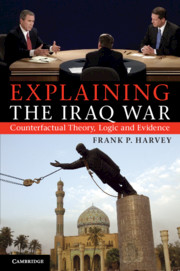Book contents
- Frontmatter
- Contents
- Figures
- Tables
- Acknowledgments
- Introduction
- 1 Comparative counterfactual analysis and the 2003 Iraq war
- 2 Leadership, political context(s) and the Iraq war
- 3 Democratic national security advisers
- 4 Domestic and congressional politics
- 5 American intelligence failures and miscalculations
- 6 Societal pressures and public opinion
- 7 International politics, global WMD consensus and UN power balancing
- 8 Hussein’s mistakes, miscalculations and misperceptions
- 9 Summary and implications
- 10 Conclusion
- Bibliography
- Index
3 - Democratic national security advisers
Published online by Cambridge University Press: 05 June 2012
- Frontmatter
- Contents
- Figures
- Tables
- Acknowledgments
- Introduction
- 1 Comparative counterfactual analysis and the 2003 Iraq war
- 2 Leadership, political context(s) and the Iraq war
- 3 Democratic national security advisers
- 4 Domestic and congressional politics
- 5 American intelligence failures and miscalculations
- 6 Societal pressures and public opinion
- 7 International politics, global WMD consensus and UN power balancing
- 8 Hussein’s mistakes, miscalculations and misperceptions
- 9 Summary and implications
- 10 Conclusion
- Bibliography
- Index
Summary
Clearly, presidential advisers have a direct impact on the selection and ranking of important foreign policy issues, how these issues are framed, and the information presidents are provided when choosing from among competing options for dealing with crises. The influence of advisers will vary, but, in the interest of comparing the quality of counterfactual claims, it’s important to ask who Gore would have selected for his national security team, and what their views, opinion, beliefs and recommendations would likely have been based on relevant statements and speeches on either Iraq or Bush’s foreign policy.
The quotations included in Appendices 3.1 and 3.2 clearly convey the views held by Gore’s senior advisers and confirm their support for the same liberal internationalist, assertive multilateral policies the former vice president defended throughout his political career. There is no reasonable explanation why, for example, Senators Hillary Clinton and John Kerry would authorize the use of force in October 2002 to buttress the UN-based multilateral approach to inspections but reject the same policy if it was put forward by a Democratic president.
- Type
- Chapter
- Information
- Explaining the Iraq WarCounterfactual Theory, Logic and Evidence, pp. 90 - 125Publisher: Cambridge University PressPrint publication year: 2011

